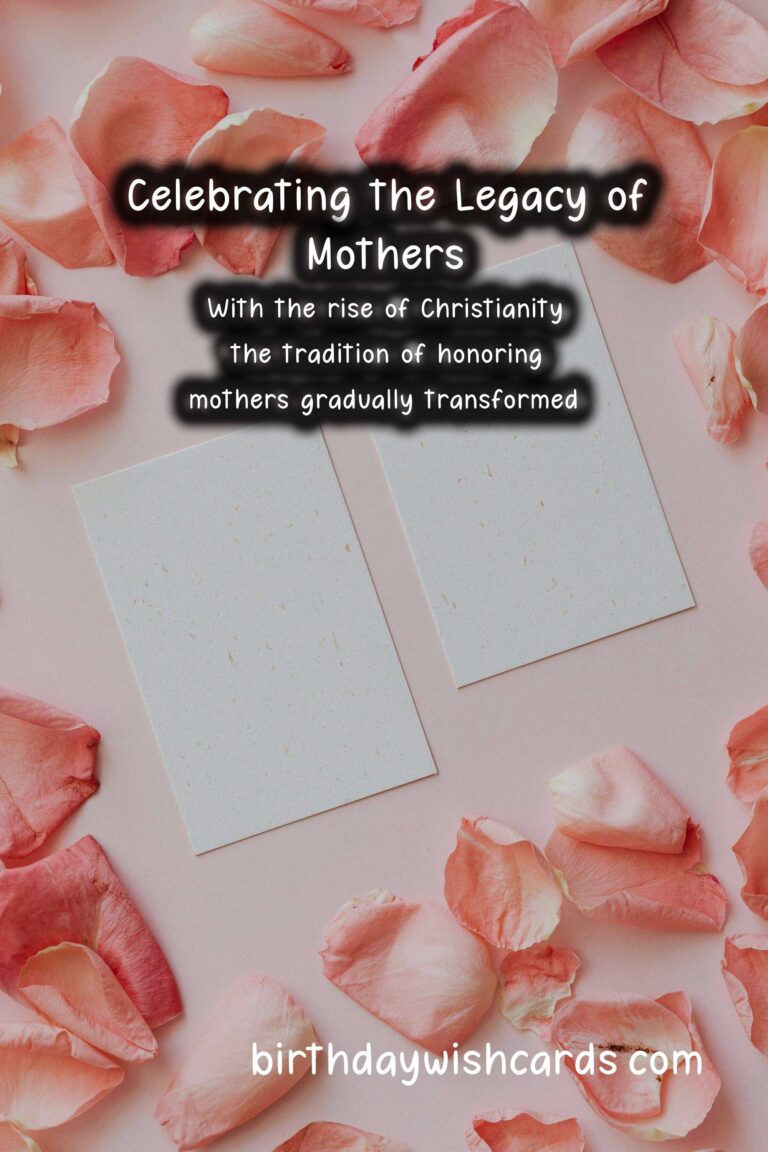
Mother’s Day is a unique celebration dedicated to honoring mothers and maternal figures around the world. It is a day when we express gratitude for the love, sacrifices, and support that mothers provide throughout our lives. But have you ever wondered how this cherished holiday came to be? In this article, we will explore the fascinating history behind Mother’s Day, tracing its roots from ancient times to its modern-day celebration.
Ancient Origins of Mother’s Day
The celebration of mothers can be traced back to ancient civilizations. The ancient Greeks held festivals in honor of Rhea, the mother of the gods. Over in ancient Rome, the holiday known as Hilaria was celebrated to honor Cybele, a mother goddess, during the vernal equinox. Although these ceremonies were often filled with festivities, they served a deeper purpose: to acknowledge the divine and earthly mothers.
Christian Influence: Mothering Sunday
With the rise of Christianity, the tradition of honoring mothers gradually transformed. In the United Kingdom, during the 16th century, a day known as Mothering Sunday emerged. This day fell on the fourth Sunday of Lent and provided children who were working away from home the opportunity to return to their mother church and spend time with their families. Originally, Mothering Sunday was a religious occasion, where the faithful would return to their hometown parish to attend services and pay tribute to mothers.
The American Beginnings
The American Mother’s Day as we know it began in the early 20th century. In 1908, Anna Jarvis held a memorial for her mother, Ann Reeves Jarvis, at St. Andrew’s Methodist Church in Grafton, West Virginia. Ann Reeves Jarvis had been a peace activist, creating Mother’s Day Work Clubs to address public health issues. Anna wanted to honor her mother’s legacy and started a campaign to establish a national holiday to celebrate motherhood.
Establishment of Mother’s Day
In 1914, President Woodrow Wilson signed a proclamation declaring the second Sunday in May as Mother’s Day. This marked the official recognition of Mother’s Day as a national holiday in the United States. Anna Jarvis’s dream had come true, but she quickly became disillusioned with the commercialism that surrounded the holiday. She fought against the commercialization and urged people to return to the day’s meaningful roots.
Mother’s Day Worldwide
While Mother’s Day has its origins in the United States, many countries around the world celebrate mothers in various ways. For example, many Latin American countries celebrate the holiday on May 10th, while some countries in Europe have different dates. In Thailand, Mother’s Day is celebrated in August, coinciding with the birthday of Queen Sirikit. Each of these celebrations has its unique trademarks, but the essence remains the same: honoring mothers everywhere.
Modern Celebrations
Today, Mother’s Day is celebrated with cards, flowers, and gifts as a way to express love and appreciation. Many families gather for special meals or activities to spend quality time together. Retailers capitalize on this day by offering special deals, emphasizing how important it is to celebrate mothers. However, it is important to remember the original intent behind the holiday: to acknowledge and honor the sacrifices made by mothers.
Mother’s Day and Cultural Significance
Mother’s Day serves a significant cultural purpose, acting as a reminder of the important role that mothers play in society. This day not only strengthens family bonds but also provides an opportunity for reflection on the influence and impact that mothers have on their children’s lives. In many cultures, honoring women and mothers is integral to the community’s well-being and stability.
Controversies and Criticisms
While Mother’s Day is widely celebrated, it also comes with its fair share of criticisms. Many argue that the holiday has lost its meaning and has become too commercialized. Some feminists criticize the day for perpetuating traditional gender roles and the expectation that women should be self-sacrificing caregivers. Anna Jarvis herself lamented the commercialization of the holiday she invented and spent much of her later life trying to retract her support for the holiday.
Conclusion: A Day of Reflection
Mother’s Day is more than just a day for gifting; it is a time for reflection and appreciation. As we celebrate this holiday, it is essential to remember its roots and significance. This day serves as a reminder to honor not just our biological mothers but also maternal figures in our lives who have guided us, nurtured us, and shaped us into who we are. Let us take a moment to express our gratitude, love, and respect for the incredible women in our lives every Mother’s Day.
Mother’s Day is a unique celebration dedicated to honoring mothers and maternal figures around the world. With the rise of Christianity, the tradition of honoring mothers gradually transformed.

